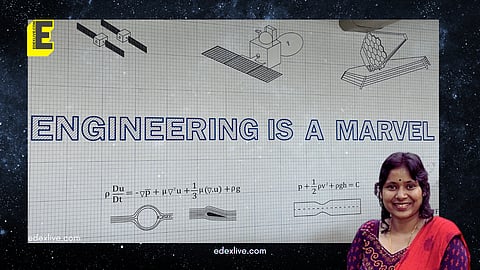

Growing up, skies always excited me. This fascination led me to pursue a career that investigated space and beyond. However, the journey was not an easy climb. After not being able to qualify for the pilot training program, I expanded my horizons to see other ways of realising my dream.
While pursuing a master's degree in computer science, I ventured into the world of Physics as well. This dual pursuit opened doors to the prestigious Institute for Plasma Research in Ahmedabad, where I immersed myself in Plasma Physics and earned my PhD and postdoctoral research.
But if you are still confused about what I do, imagine a complex miniature engine, weighing less than 0.5 kilos, that utilises electromagnetic fields to ionise and accelerate particles to incredible speeds of 10-15 kilometers per second. Shouldn't this excite you? This is the essence of the technology I work on. It is the heart that propels satellites across the vast emptiness of space.
Now where can you start?
SpaceTech offers a diverse range of career paths:
- From designing and building as a Satellite Systems Engineer
- To qualifying electronics to withstand harsh space environments as an Avionics Engineer
- And designing structures that can withstand intense launch vibration loads as a Structural Engineer
- Researchers and scientists delve into space physics and astronomy
- While data scientists analyse vast datasets from space-based sensors.
- Mission control specialists ensure safe spacecraft operations
- And, Robotics engineers create space-compatible robotic systems for exploration and servicing.
Space is truly multi-disciplinary
In my work environment, I was able to witness colleagues coming from diverse education backgrounds including mechanical engineering, power electronics, embedded electronics, aerospace engineering, astrodynamics, nanosciences, applied physics, plasma physics, organic chemistry, metallurgy & material sciences, software engineering & Artificial Intelligence (AI) and so on.
Aspiring professionals should consider a strong foundation in STEM (Science, Technology, Engineering, and Mathematics) as their launchpad into the world of SpaceTech.
Depending on your interests, a bachelor's degree in aerospace engineering equips you with knowledge of spacecraft design, propulsion systems, and launch vehicles.
For data enthusiasts, the space industry offers opportunities in satellite data processing, AI-based control systems, and autonomy.
A BTech in Electronics and Communication Engineering (ECE) prepares you to work on the vital aspects of satellite communications, signal processing, and sensor systems.
For those seeking deeper specialisation, advanced degrees like a Master's in Space Science or Aerospace Engineering offer in-depth knowledge in areas like propulsion technologies and spacecraft systems. Additionally, courses in AI, robotics, and data science are becoming increasingly valuable as they contribute to cutting-edge applications like space robotics, autonomous mission planning, and satellite imagery analysis.
Bridging the gap between theory and practice
Your journey into SpaceTech doesn't have to wait until graduation. Consider seeking internships at established institutions like Indian Research Space Organisation (ISRO), where you can gain invaluable exposure to large-scale space missions and established methodologies. The rapidly growing private space sector also presents exciting opportunities.
Companies like Skyroot Aerospace, Bellatrix Aerospace, Agnikul Cosmos, and Pixxel are actively seeking talented individuals, providing hands-on experience with cutting-edge technologies
Participate in research projects and international space competitions like the National Aeronautics and the Space Administration (NASA) Space Apps Challenge, Indian Space Olympiad, and Space Hackathons to learn to tackle real-world challenges that will allow you to collaborate with like-minded individuals.
Staying updated with the trends
Read journals and news on emerging technologies about space regularly. Company blogs offer firsthand accounts of research and development, and engaging with key figures on social media will provide real-time updates. By consuming information from these sources, aspiring SpaceTech professionals stay informed and adaptable. The world is at your fingertips, use it wisely and start where you are.
